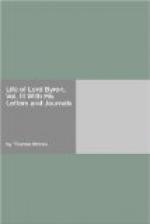“Will you remember me to Rogers? whom I presume to be flourishing, and whom I regard as our poetical papa. You are his lawful son, and I the illegitimate. Has he begun yet upon Sheridan? If you see our republican friend, Leigh Hunt, pray present my remembrances. I saw about nine months ago that he was in a row (like my friend Hobhouse) with the Quarterly Reviewers. For my part, I never could understand these quarrels of authors with critics and with one another. ‘For God’s sake, gentlemen, what do they mean?’
“What think you of your countryman, Maturin? I take some credit to myself for having done my best to bring out Bertram; but I must say my colleagues were quite as ready and willing. Walter Scott, however, was the first who mentioned him, which he did to me, with great commendation, in 1815; and it is to this casualty, and two or three other accidents, that this very clever fellow owed his first and well-merited public success. What a chance is fame!
“Did I tell you that I have translated two Epistles?—a correspondence between St. Paul and the Corinthians, not to be found in our version, but the Armenian—but which seems to me very orthodox, and I have done it into scriptural prose English.[134]
“Ever,” &c.
[Footnote 134: The only plausible claim of these epistles to authenticity arises from the circumstance of St. Paul having (according to the opinion of Mosheim and others) written an epistle to the Corinthians, before that which we now call his first. They are, however, universally given up as spurious. Though frequently referred to as existing in the Armenian, by Primate Usher, Johan. Gregorius, and other learned men, they were for the first time, I believe, translated from that language by the two Whistons, who subjoined the correspondence, with a Greek and Latin version, to their edition of the Armenian History of Moses of Chorene, published in 1736.
The translation by Lord Byron is, as far as I can learn, the first that has ever been attempted in English; and as, proceeding from his pen, it must possess, of course, additional interest, the reader will not be displeased to find it in the Appendix. Annexed to the copy in my possession are the following words in his own handwriting:—“Done into English by me, January, February, 1817, at the Convent of San Lazaro, with the aid and exposition of the Armenian text by the Father Paschal Aucher, Armenian friar.—BYRON. I had also (he adds) the Latin text, but it is in many places very corrupt, and with great omissions.”]
* * * * *




